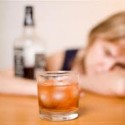Binge drinking can lead to holiday heart syndrome
Imbibing too much at the punch bowl at holiday parties or at other times when alcohol is flowing freely can hurt more than your sobriety and waistline. Overindulgence with booze can cause a condition doctors call holiday heart syndrome.
It can happen to anyone of any age. “Anywhere from very young to middle aged or elderly–no one is immune,” says cardiologist Daniel Blanchard, MD of University of California San Diego Medical Center. “If someone is a moderate alcohol drinker, they probably are less likely to have these arrhythmias, but in someone who doesn’t drink much at all, it probably wouldn’t take much to cause some problems.”
Symptoms can seem a little scary: the heart beats quickly and maybe erratically, chest pain comes on, and a person experiences shortness of breath and dizziness.
Holiday heart syndrome can strike a person with or without a history of heart problems, says the doctor. “The person may feel a rapid thumping in the chest, may feel light headed, and could even pass out,” he says. “This can happen in an otherwise normal heart, so for someone to say, ‘How could this happen, I’ve got a normal heart, I’ve had a treadmill [test], everything is normal,’ it doesn’t make you immune from the irritant effects of alcohol.”
Eileen Best has never lived for end-of-the-week happy hour binging. But when it’s the high holidays, Best does enjoy celebrating with friends with plenty of drink and merriment. “I don’t drink every day,” she says. “I drink four times a year and when I do, I do it hard!”
In order to risk holiday heart syndrome, a person must drink too much, too quickly. For most women that means four or more drinks in one sitting, for men, five or more drinks.
Not only is the average body weight lower in women than in men, but the female body contains proportionately less water than the male body, resulting in higher blood alcohol concentration with each drink.
In addition, women possess lower levels of an enzyme that helps process alcohol.
Says Dr. Blanchard, “In women, 1 to 2 glasses of wine could be enough to cause impairment of function, but usually you need to drink more than that to get holiday heart syndrome.”
The risks climb if one binges more than once during a 2 week period.
The symptoms of holiday heart syndrome can be frightening, particularly for young people and those around them when symptoms arise. “The arrhythmias are not dangerous, but can be very disconcerting,” says the La Jolla, California-based cardiologist. “In a younger person the heart rate can go very fast, up to 150 to 170 beats per minute, which is 3 times normal.”
Dr. Blanchard says rarely will holiday heart syndrome land someone in the hospital. “[Symptoms] tend to be short-lived and go away after a couple of days,” says Blanchard.
But, very rarely, arrhythmia can signal trouble–even a heart attack. “It’s very difficult for a person to tell what type of arrhythmia they are having, when they feel that ‘thump thump thump:’ it could be a ventricular arrhythmia which is much more dangerous.”
He recommends emergency room diagnosis.
“Anyone who starts having holiday heart type syndrome is clearly drinking too much and probably should stop altogether,” advises Blanchard.
While Eileen Best may enjoy a few drinks once in a while, she’s never suffered the disquieting onset of holiday heart syndrome, and plans to keep it that way. “After about four beers I call it a night,” she says. “I know what my limits are.”
While the effects of holiday heart syndrome may soon pass, a new study from Duke University suggests binge drinking during adolescence may cause long-term harm to memory later on.
In a study of lab rats, results suggest that prior exposure to binge alcohol intake during adolescence somehow affects the brain to lead it to react more sensitively to alcohol in the future.
When the rats were fully grown, those that had previously received the adolescent alcohol exposure showed the greatest disruption of working memory when a moderate dose of alcohol was given.
While the researchers acknowledge that rats are not humans, given the fact approximately 23 percent of all university students are frequent binge drinkers (according to Duke statistics), if there are parallels in humans, chronic adolescent drinking could signal a real public health problem.
Further research on the effects of alcohol on the brain is needed, say the researchers.
source: Little About

